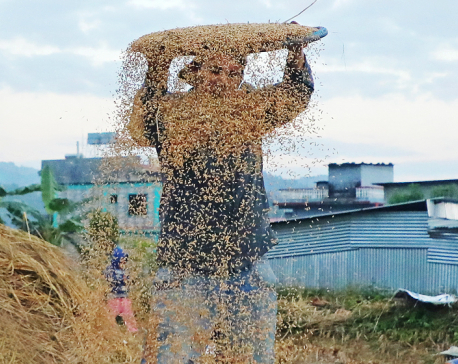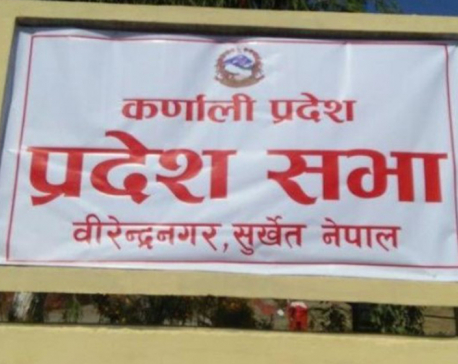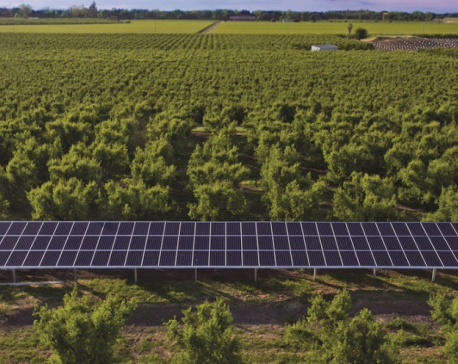
OR
Seven Karnali Province districts food-insecure
Published On: September 11, 2019 10:47 AM NPT By: Nagendra Upadhyay & Ganesh Bishu
BIRENDRANAGAR, Sept 11: Karnali is the largest province of the country in terms of area. However, only 11.85% of the total area of this remote province is cultivable.
Data compiled by Ministry of Land Management, Agriculture and Cooperative (MoLMAC), Karnali Province, shows farming is done in only 75.5% of arable land. Similarly, irrigation is available in only 22.9% of arable land. This means large swathe of farm land in the area is dependent on rain water. It is one of the reasons behind low productivity of agriculture in the province.
A recent data of Nepal Rastra Bank (NRB) shows harvests of 77.5% of households in the province is not sufficient even to feed them. Of the 10 districts of the province, only Rukum, Salyan and Surkhet area in a food surplus situation. Remaining seven districts – Dailekh, Jajarkot, Kalikot, Dolpa, Humla, Mugu, and Jumla – are food-deficit.
Talking to Republica, Pemba Gururu, a local of Dolpa said, all the households of the province except those living in urban areas are suffering from food insecurity. “Harvests in Upper Dolpa, for example, suffice for only three months,” he added.
There is a huge difference in share of provinces in national GDP. While contribution of Province 3 to GDP is 31.9%, Karnali Province has share of only 4.1%.
Karnali Province is implementing 96 irrigation projects. According to the Minister for Land Management, Agriculture and Cooperatives, Bimala KC, the projects will irrigate 353 hectares of land. Karnali produces around 326,573 hectares of crops annually against the annual demand for 352,573 tons. This means the province is suffering from deficit of 25,428 tons of food annually, according to Hari Prasad Pandit, the spokesperson for the ministry.
He, however, added that the provincial government has implemented different income-generating programs to prevent scarcity of food.
“Food insecurity doesn’t mean food crisis. There will be crisis only if food supply is affected due to floods and landslides and the market runs out of stock,” added Pandit. “As climatic condition in hilly and hilly areas is not suitable for cereal crops, we are encouraging farmers to take up fruits and vegetables farming.”
As part of preventing food insecurity, the provincial assembly has already approved Right to Food and Food Sovereignty Act, 2075. Similarly, the provincial government is implementing a special program for farmers in the most poverty-ridden settlement of a backward rural municipality of all 10 districts. The ministry has stated that the program will help to prevent food crisis in such areas.
Agri production in Karnali Province is growing by 4.80% annually.
You May Like This

Karnali sees drop in agricultural yields
KARNALI, July 28: Agriculture yields have dropped in the Karnali province. It has been found that overall agriculture production had... Read More...

Four UML Province Assembly members breaching party whip lose their positions
KATHMANDU, August 2: Four CPN-UML lawmakers in Karnali Provincial Assembly have lost their positions as lawmakers for breaching party’s whips... Read More...

Tapping into the sun
Using the sun to dry crops and grain is one of the oldest applications of solar energy in agriculture. These... Read More...






Just In
- Challenges Confronting the New Coalition
- NRB introduces cautiously flexible measures to address ongoing slowdown in various economic sectors
- Forced Covid-19 cremations: is it too late for redemption?
- NRB to provide collateral-free loans to foreign employment seekers
- NEB to publish Grade 12 results next week
- Body handover begins; Relatives remain dissatisfied with insurance, compensation amount
- NC defers its plan to join Koshi govt
- NRB to review microfinance loan interest rate











Leave A Comment